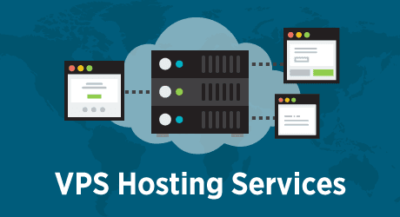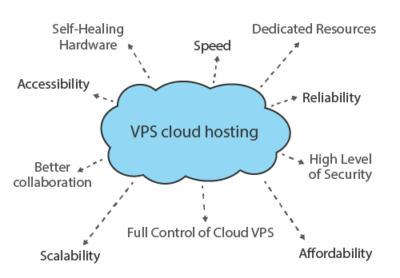Blog
A Comprehensive Guide to VPS Web Hosting

VPS Web Hosting – Advantages and Features
Introduction:
When it comes to establishing a robust online presence for your business, choosing the right web hosting service is crucial. Among the various options available, VPS Web Hosting stands out as a reliable and versatile solution for businesses of all sizes. In this comprehensive guide, we’ll delve into the world of VPS hosting, exploring its advantages and features, and provide you with all the information you need to make an informed decision for your business’s online needs.
Understanding VPS Web Hosting:
A. What is VPS Hosting?
VPS, or Virtual Private Server, hosting is a web hosting solution that bridges the gap between shared hosting and dedicated hosting. In a VPS environment, a physical server is partitioned into multiple virtual servers, each acting as an independent instance with its own dedicated resources, operating system, and control.
B. How VPS Hosting Differs from Shared Hosting and Dedicated Hosting
Shared hosting involves sharing server resources with other websites, often leading to performance bottlenecks. Dedicated hosting offers exclusive access to an entire physical server, but it can be expensive and excessive for smaller businesses. VPS hosting strikes a balance by providing isolated resources at a more affordable price point.
C. Key Components of VPS Hosting
VPS hosting comprises essential components such as CPU, RAM, storage, and bandwidth. These resources are allocated to each virtual server, ensuring consistent performance and preventing the “neighbor effect” that can occur in shared hosting.
Advantages of VPS Hosting for Business:
A. Enhanced Performance and Reliability
VPS hosting guarantees better performance than shared hosting due to dedicated resources. Your website’s loading times and responsiveness are improved, enhancing user experience and SEO rankings.
B. Scalability and Flexibility
As your business grows, so will your website’s demands. VPS hosting offers scalability, allowing you to easily upgrade your resources to accommodate increased traffic and data requirements.
C. Isolated Resources for Improved Security
In VPS hosting, your resources are isolated from other users, reducing the risk of security breaches and data leaks. This enhanced security is crucial for protecting sensitive customer information.
D. Customization and Control
VPS hosting provides root access, enabling you to install and configure software according to your business’s needs. You have full control over your environment, making it easier to tailor your server to your requirements.
E. Cost-Effectiveness for Growing Businesses
Compared to dedicated hosting, VPS hosting offers a cost-effective solution without compromising on performance. It’s an ideal choice for businesses that anticipate growth but need to manage their budgets wisely.
Features of a Reliable VPS Hosting Service:
A. Server Uptime and Reliability
A trustworthy VPS web hosting provider guarantees high server uptime, minimizing the risk of downtime that could negatively impact your business.
B. Server Resources and Specifications
Choose a VPS web hosting plan that aligns with your business’s needs, ensuring sufficient CPU, RAM, and storage resources for seamless operations.
C. Operating System Options
A variety of operating systems are available in VPS web hosting, allowing you to choose the one that best suits your website’s requirements.
D. Control Panel and User Interface
A user-friendly control panel simplifies server management, making configuring settings, managing domains, and monitoring performance easier.
E. Customer Support and Technical Assistance
Responsive customer support is essential in case you encounter any issues. Look for a VPS hosting provider that offers 24/7 technical assistance to ensure your website runs smoothly.
Choosing the Right VPS Hosting Plan for Your Business:
A. Assessing Your Business Needs and Requirements
Evaluate your website’s traffic, resource usage, and growth projections to determine the optimal VPS hosting plan.
B. Evaluating Hosting Providers and Their Offerings
Research multiple hosting providers, comparing their features, pricing, and customer reviews to make an informed choice.
C. Factors to Consider When Selecting a VPS Hosting Plan
Consider factors such as scalability options, server locations, backup solutions, and additional services that align with your business’s needs.
Setting Up and Managing Your VPS Hosting:
A. Step-by-Step Guide to Setting Up Your VPS
Follow a comprehensive guide provided by your hosting provider to set up your VPS, including initial configuration and software installations.
B. Best Practices for Managing and Optimizing VPS Hosting
Implement practices such as regular updates, security audits, and resource optimization to ensure your VPS performs optimally.
C. Common Issues and Troubleshooting Tips
Learn about potential challenges you might encounter and how to troubleshoot common issues effectively.
Migrating to VPS Hosting from Other Hosting Solutions:
A. Preparing for the Migration Process
Backup your data, plan the migration carefully, and inform your users about the upcoming changes.
B. Tools and Methods for Seamless Migration
Utilize migration tools provided by your hosting provider or follow manual migration procedures to minimize downtime.
C. Post-Migration Considerations and Testing
After migrating, thoroughly test your website to ensure all functionalities work as expected.
Advanced VPS Hosting Features and Add-ons:
A. Understanding Advanced VPS Hosting Features
Explore features such as load balancing, automatic backups, and DDoS protection to enhance your website’s performance and security.
B. Additional Services and Add-ons to Enhance Performance
Consider integrating content delivery networks (CDNs), SSL certificates, and caching mechanisms to further optimize your website’s speed and security.
C. Security Measures and Backup Solutions
Prioritize security by implementing firewalls, intrusion detection systems, and regular data backups to safeguard your business’s sensitive information.
VPS Hosting for Specific Business Needs:
A. E-commerce Websites and VPS Hosting
E-commerce sites benefit from VPS hosting’s reliability, security, and scalability, ensuring a seamless shopping experience for customers.
B. Web Applications and VPS Hosting
Web applications require robust resources and customization, making VPS hosting an ideal choice to meet these demands effectively.
C. Growing Businesses and VPS Hosting
As your business expands, VPS hosting provides the flexibility to accommodate increased traffic and resource requirements without disrupting operations.
Frequently Asked Questions about VPS Hosting:
A. Common Queries and Concerns
Address common questions related to VPS hosting, such as pricing, technical support, and migration.
B. Concise Answers and Explanations
Provide clear and concise answers to FAQs, ensuring readers have a thorough understanding of VPS hosting.
Conclusion:
In the world of business web hosting, VPS hosting emerges as a powerful solution that offers the perfect balance of performance, scalability, security, and customization. By understanding the advantages and features outlined in this comprehensive guide, you’re equipped to make an informed decision that will undoubtedly contribute to your business’s growth and success. Choose the right VPS hosting solution, and pave the way for a resilient online presence that supports your aspirations.



